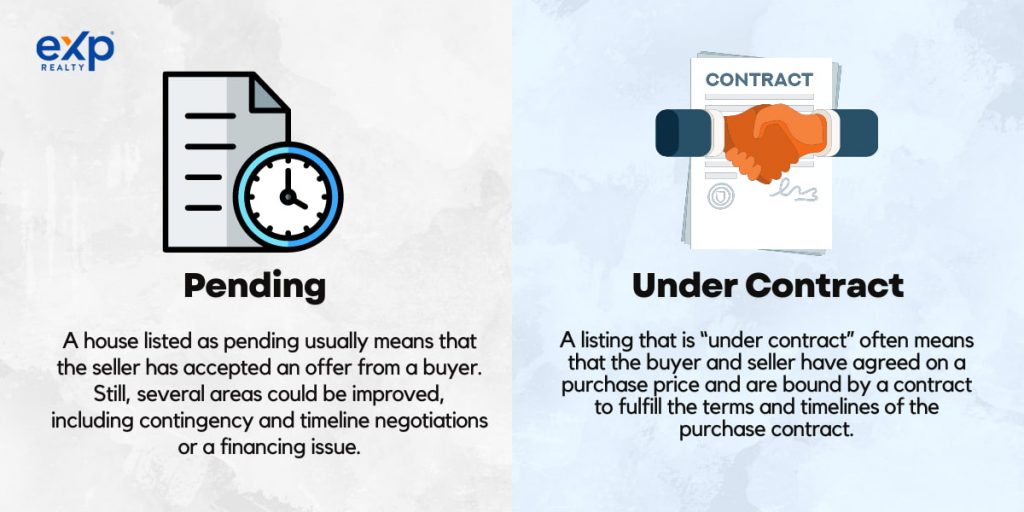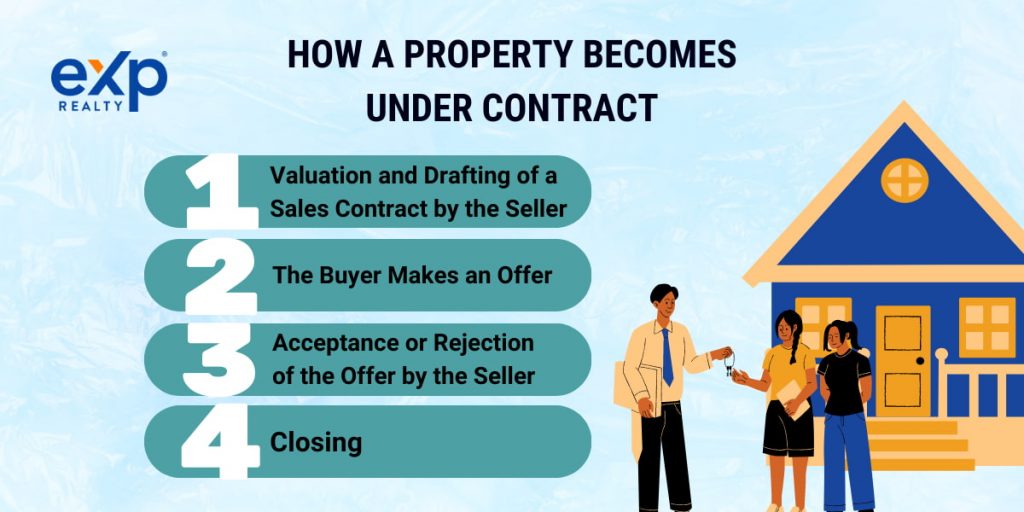What Does Under Contract Mean in Real Estate? and why it matters. Learn how it affects buying and selling. Understand the process and be prepared for your next steps.

Understanding the term “under contract” is crucial for both buyers and sellers. It indicates that the parties involved have reached an agreement and have legally committed to proceed with the transaction. The property is temporarily off the market and awaits final approvals, inspections, and financing arrangements.
This phase is significant as it marks the transition from negotiation to closing. Buyers should be prepared for the next steps, including securing financing and completing necessary inspections. Sellers need to ensure all agreed-upon conditions are met. This period requires careful attention to detail from both parties to ensure a successful closing.
Definition Of Under Contract
In real estate, the term under contract signifies that a seller has accepted a buyer’s offer. This means both parties have signed a purchase agreement. The property is not yet sold, but steps are in place for the sale to proceed.
Legal Implications
When a property is under contract, it means a legally binding agreement exists. Both the buyer and seller must follow the terms outlined in the contract. If either party fails to meet these terms, legal consequences may follow.
- Both parties must meet deadlines.
- Inspections and appraisals are often required.
- Financing must be secured by the buyer.
Failing to adhere to these terms can result in penalties. It can also lead to the contract being voided.
Common Misconceptions
Many people think under contract means the property is sold. This is not true. The property is still available, but it is reserved for the buyer in the contract.
- Under contract does not mean the sale is final.
- The buyer can still back out during the inspection period.
- Other buyers can submit backup offers.
Understanding these points can help avoid confusion. It ensures all parties know the property’s status.
Process Of Going Under Contract

Credit: exprealty.com
What Does Under Contract Mean in Real Estate? The process of going under contract is crucial in real estate. It involves several steps to secure a property legally. Understanding each step helps buyers and sellers navigate smoothly.
Initial Offer
The process begins with the initial offer. The buyer submits a written offer to the seller. This offer includes the proposed purchase price and terms. The offer is a formal statement of the buyer’s intent to purchase. It is important to make a competitive offer. The seller will review this offer carefully.
Acceptance And Counteroffers
If the seller likes the offer, they can accept it. The property then goes under contract. But often, sellers make counteroffers. A counteroffer changes some terms of the original offer. The buyer then reviews the counteroffer. They can accept, reject, or counter it again.
This negotiation can go back and forth. Both parties aim for a mutually agreeable contract. Once both agree, they sign the contract. At this point, the property is officially under contract.
Contingencies In Real Estate Contracts
Contingencies in real estate contracts are conditions that must be met. These conditions protect both the buyer and the seller. They ensure that the deal is fair and secure. If the conditions aren’t met, the contract can be voided.
Inspection Contingencies
Inspection contingencies allow buyers to inspect the property. The buyer can hire a professional to do this. If issues are found, the buyer can ask for repairs. They may also renegotiate the price or even cancel the contract. This protects the buyer from unexpected problems.
Financing Contingencies
Financing contingencies are about the buyer getting a loan. The buyer must secure financing by a set date. If they can’t get a loan, they can back out of the deal. This protects the buyer from being forced to buy without money.

Credit: exprealty.com
Roles Of Buyer And Seller
What Does Under Contract Mean in Real Estate? Understanding the roles of buyer and seller is vital in real estate. Each party has specific duties once a property is under contract. These responsibilities ensure a smooth transaction and help avoid delays.
Buyer Responsibilities
Buyers must complete several tasks after the contract is signed.
- Secure Financing: Ensure mortgage approval from the lender.
- Home Inspection: Schedule and attend a home inspection.
- Appraisal: Arrange for a professional property appraisal.
- Insurance: Obtain homeowner’s insurance for the property.
- Review Documents: Carefully review all closing documents.
Seller Responsibilities
Sellers also have important duties to fulfill once the contract is signed.
- Disclosures: Provide all required property disclosures.
- Repairs: Complete any agreed-upon repairs before closing.
- Access: Grant the buyer access for inspections and appraisals.
- Utilities: Keep utilities connected until the closing date.
- Documents: Prepare and provide all necessary closing documents.
| Task | Buyer | Seller |
|---|---|---|
| Secure Financing | Yes | No |
| Home Inspection | Yes | No |
| Appraisal | Yes | No |
| Insurance | Yes | No |
| Disclosures | No | Yes |
| Repairs | No | Yes |
| Access | No | Yes |
| Utilities | No | Yes |
| Documents | Yes | Yes |
Impact On Real Estate Market
The term under contract in real estate signifies that a seller has accepted a buyer’s offer. This status impacts the real estate market in various ways. Understanding these impacts can help both buyers and sellers make informed decisions.
Market Trends
When a property goes under contract, it affects market trends. It can indicate market stability or volatility. Many properties under contract might show a seller’s market. Few properties under contract might indicate a buyer’s market. This data helps analysts predict future market movements.
Buyer Competition
Properties under contract can increase buyer competition. Buyers may feel urgency to act quickly. They might bid higher to secure a property. This can drive up property prices. It also increases the pressure on buyers to make quick decisions.
Here’s a comparison of the impact on market trends and buyer competition:
| Impact | Market Trends | Buyer Competition |
|---|---|---|
| Indication of Market Type | Shows if it’s a seller’s or buyer’s market | Increases urgency among buyers |
| Price Influence | Helps in predicting future price trends | Can drive property prices up |
| Decision Making | Assists in market analysis | Forces quick buyer decisions |
Understanding these impacts helps both buyers and sellers. It allows them to navigate the real estate market effectively. Being informed can lead to better decisions and outcomes.
How Long Does Under Contract Last?
What Does Under Contract Mean in Real Estate? Understanding the term under contract in real estate is crucial. It signifies that a buyer’s offer has been accepted, and the process of closing the deal has begun. But how long does this period last? Let’s explore the details.
Typical Timeframes
The duration of being under contract varies. A typical timeframe is between 30 and 60 days. This period allows for necessary inspections, appraisals, and financing arrangements.
Here is a simple breakdown:
- Inspections: Usually completed within 7-14 days.
- Appraisals: Typically take around 10-14 days.
- Financing: Can take up to 30 days or more.
These steps ensure the property meets all conditions before finalizing the sale.
Factors Affecting Duration
Several factors can affect how long a property remains under contract. These factors can either shorten or lengthen the process:
| Factor | Impact |
|---|---|
| Inspection Issues | Can delay due to repairs needed. |
| Appraisal Value | Low appraisals may require renegotiation. |
| Financing Approval | Delays if the buyer’s loan gets stalled. |
| Title Search | Issues with the title can extend the contract period. |
Understanding these factors helps manage expectations during the under-contract phase.
What Happens If A Contract Falls Through?
In real estate, a contract falling through can be stressful. Both buyers and sellers face uncertainty. Understanding the reasons and next steps can help.
Common Reasons
Contracts fall through for various reasons. Here are some common causes:
- Financing Issues: The buyer may not secure a mortgage.
- Inspection Problems: Home inspections reveal major problems.
- Appraisal Gaps: The home appraises for less than the sale price.
- Title Issues: Title defects or liens are discovered.
- Buyer’s Remorse: The buyer changes their mind.
Next Steps
If a contract falls through, here’s what you can do:
- Review the Contract: Understand the contingencies and clauses.
- Communicate: Talk with your real estate agent.
- Resolve Issues: Fix the problem if possible.
- Relist the Property: Put the home back on the market.
- Consider New Offers: Evaluate new potential buyers.
These steps can help you move forward. Stay calm and work with your agent. They can guide you through the process.

Credit: orchard.com
Tips For Buyers And Sellers
Buying or selling a home can be challenging, especially when the property is “under contract.” Both buyers and sellers need to be prepared for this critical phase. Here are some essential tips to help you navigate successfully.
Negotiation Strategies
Negotiation is key to reaching a fair agreement. Buyers should always make a reasonable offer. Sellers should be open to counteroffers.
- Buyers: Submit a strong offer with pre-approval.
- Sellers: Consider all offers carefully and respond promptly.
- Both: Use a skilled real estate agent for guidance.
Preparing For Closing
Closing is the final step in the real estate process. Both parties need to be prepared. Here’s a checklist to help you:
| Task | Buyer | Seller |
|---|---|---|
| Secure Financing | Yes | No |
| Home Inspection | Yes | No |
| Review Closing Documents | Yes | Yes |
| Final Walkthrough | Yes | No |
Buyers: Ensure your financing is in order and conduct a final walkthrough.
Sellers: Make sure the property is in agreed-upon condition.
By following these tips, both buyers and sellers can have a smoother, more successful real estate transaction.
Conclusion
What Does Under Contract Mean in Real Estate? Understanding “under contract” in real estate is crucial for buyers and sellers. It signifies a binding agreement. This stage offers a clear path towards closing. Knowing its implications helps in making informed decisions. Stay proactive during this phase to ensure a smooth transaction.
Always consult professionals for guidance and clarity.
FAQs For What Does Under Contract Mean in Real Estate?
What’s The Difference Between Pending And Under Contract?
Pending means the seller has accepted an offer but is still completing steps. Under contract means both parties have signed agreements.
Can You Make An Offer On A Property That Is Under Contract?
Yes, you can make an offer on a property under contract. The seller may consider backup offers.
How Often Does Under Contract Fall Through?
Under contract deals fall through about 5-10% of the time. Common reasons include financing issues and inspection problems.
Does Under Contract Mean Off The Market?
Yes, under contract means the property is not available. The seller has accepted an offer from a buyer.






